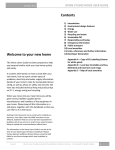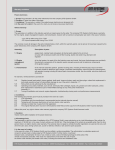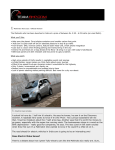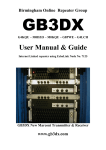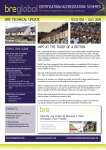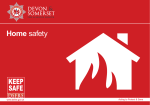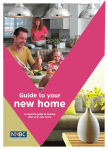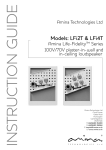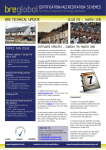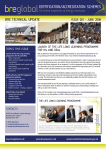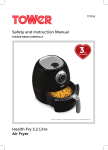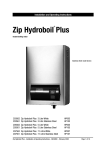Download Home User Guide - Broadland Housing Group
Transcript
Home User Guide
For Rented Accommodation
All about your home
Contents
Your New Home
4
Utility Services
5
Saving Energy
8
Facilities Provided
11
Housekeeping and
Money Saving Tips
15
Cleaning Advice
17
Recycling and Waste
19
Home Security
21
Fire Safety in the Home
22
Further Information
23
2
Welcome
to Broadland Housing Association
This handbook contains everything you
need to know to manage your home.
Customer Services 0303 303 0003
3
All about your home
Your New
Home
New homes should be run-in gently over the first
12 months. A modern building contains a variety
of materials that will have absorbed water during
construction. This will not be noticeable but it does
need to evaporate slowly and be ventilated away.
Drying Out
As your home is lived in and heated, timber and
other materials will shrink and the appearance of minor
cracking or small areas of blistering of paint may occur,
which is best to leave until the end of the 12 month
defects period when these faults can be corrected.
Mildew
Mildew growth finds suitable conditions on timber,
plaster and particularly emulsion painted surfaces
where there is dampness and lack of ventilation.
Mildew is particularly likely to occur in small closed
rooms, cupboards and in corners of larger rooms
where the ventilation and air movement is poor. In
most cases mildew can be quite simply wiped off
the surface of the paintwork using a solution of warm
water with a proprietary domestic cleaner. Normally
no damage will occur to the surface through mildewing.
To minimise cracking, try to keep a reasonably even
temperature throughout your home, even in rooms
which are not occupied.
Efflorescence
This takes the form of a white chalk like appearance
and can be characteristic on brickwork and plywood
surfaces as a consequence of drying out.
Your home needs to be kept well ventilated to allow
moisture to evaporate as the structure dries out. Leave
windows or, at least, the trickle vents (slotted vents
in the window frame) open for as long as you can
each day but remembering to close all windows
before leaving.
This is caused by natural salts coming out of the wall
materials and is quite normal. It is not harmful and usually
disappears over time. If efflorescence occurs on internal
walls it can be wiped or brushed away. If efflorescence
persists internally, it could indicate a water leak, in which
case you should contact Broadland Housing.
Any problem of this type encountered in the property
within the first 12 months should be drawn to the
attention of Broadland Housing at the time of the
defects inspection or by phoning Customer Services
should cracking be severe.
Condensation
Condensation occurs when warm moist air comes into
contact with a cold surface. During the initial drying out
period of a building, particularly the first 12 months, it is
likely that the internal air will be more moist than usual
and it is essential that good ventilation be maintained.
To reduce condensation to a minimum it is important to
maintain a warm, but not over hot temperature and to
keep all rooms ventilated. Particularly, great care should
be taken to ensure that the room is well ventilated when
carrying out operations involving a lot of steam and
water vapour, such as cooking, bathing, washing and
drying clothes. Under no circumstances should
paraffin or 'Calor' gas heaters be used as these
generate considerable moisture through combustion.
Condensation should be mopped up regularly where
it accumulates on window sills to prevent damage
to plaster.
4
Utility
Services
Please familiarise yourself with the services and
equipment in your home as detailed on the following
pages and detailed in the ‘My Home’ supplement.
Services Locations
Please refer to the ‘My Home’ supplement.
Location of Equipment
Please refer to the ‘My Home’ supplement.
External Services
If, when digging in your garden, you locate any services
please report them to Broadland Housing immediately.
It is most unlikely that you will come across any unless
you are digging very deep (never dig deeper than
450mm (18”) in your front or rear garden without prior
consultation), which in any event should be avoided.
It is quite normal for services to be located in your
front garden, as these will be servicing your home.
GAS
Please contact your gas supplier to have the supplies
put into your name as soon as you move in. Details can
be found within the ‘My Home’ supplement.
Alternatively you can arrange your supply from a wide
range of utility suppliers once you have received your
first bill from your current supplier. Please make any
arrangements direct with the relevant company.
If you suspect a gas leak:
• Extinguish all naked flames.
• Turn off the gas at the meter.
• Open all doors and windows.
• Call National Grid on telephone 0800 111 999
(also inform Broadland Housing).
• Do not turn on any switches or electrical
apparatus.
In the event of any gas installation / equipment
defect or a suspected gas leak you should report
the matter in the usual manner to your gas supplier
or make an emergency call to National Grid on
0800 111 999.
5
All about your home
Utility
Services
ELECTRIC
Please contact your electricity supplier to have the
supplies put into your name as soon as you move in.
Details can be found within the ‘My Home’ supplement.
Alternatively you can arrange your supply from a wide
range of utility suppliers once you have received your
first bill from your current supplier. Please make any
arrangements direct with the relevant company.
The electricity consumer unit contains the mains on/off
switch, which controls the supply to your home and a
number of circuit breakers. Each of these protects a
different circuit and will be labelled for your information.
These circuit breakers are very sensitive, much more
so than the fuses you may be familiar with.
RCD's (Residual Current Devices) have a test button
located in the consumer unit and you should carry out
a test every six months as detailed on the unit or user
guide. Remember to reset electrical equipment with
timers after testing.
Should the electricity circuit become overloaded; the
breaker will 'trip'. This can be re-set manually by
pushing the switch back to its original position.
NOTE: We receive many reports of faulty electrics or
trip switches in new properties but these are usually due
to faulty appliances. Your appliance may have worked
perfectly at your old address but the new sensitive circuit
breakers will detect any small fault that may not have
been apparent under the old system.
If the circuit breaker trips more than once you will have
to find out which appliance is causing the problem.
To find out which appliance is faulty:
1. Switch every appliance off
2. One by one - slowly turn appliances on until the
system trips (If it is the washing machine, you
may have to wait for it to complete a full cycle)
6
In general, try not to overload the circuits by having
a large number of appliances on at the same time.
Electrical works can be extremely dangerous and
only undertaken by a qualified electrician appointed
by Broadland Housing. For your own safety please
refrain from attempting any works to the electrical
circuits in your home.
Broadland Housing will maintain all appliances,
which have been installed by them.
WATER
Please contact your water supplier to have the supplies
put into your name as soon as you move in. Details can
be found within the ‘My Home’ supplement.
The internal stopcock should be turned off and on again
every 6 months to prevent seizure.
If you think your pipes are frozen, do not turn on the hot
water taps, as this will empty the hot water cylinder.
Where pipes run under the floor they are normally
identified with a marker or pencil line. Care should be
taken when fitting carpets not to damage concealed
pipes.
As well as being irritating, dripping taps can stain sanitary
ware; they should be attended to as soon as possible.
Do not allow water to overflow from storage tanks or
cisterns. In time it may damage the fabric of the building.
If water is seen running from any of the overflow pipes
IMMEDIATELY investigate. In the case of the WC cistern
it may simply require adjustment of the ballcock. Report
any persistent overflow to Broadland Housing who will
arrange for a plumber to attend.
In your new home you will be charged for the
consumption of water as recorded by your water meter.
Useful websites
www.anglianwater.co.uk
www.water.org.uk
7
All about your home
Saving
Energy
There are many things you can do to save energy that
cost nothing. These are often called 'behavioural'
methods because they involve us changing behaviour.
This is not always as easy as it sounds, because we tend
to do 'bad' things – like switching off the television with
the remote control – almost without thinking about it. We
need to 'think' about what we do and make a conscious
effort to change, so that it becomes a habit. The
following are just a few things we can do:
• When making a cup of tea, boil only the amount of
water you need – don't automatically fill the kettle.
• Don't leave appliances on when there's no-one in
the room.
• Don't have windows open when the heating is on; if
you want to air a room turn the heating off for half an
hour or so.
• Turn the television off at the set, not with the remote
control ('standby') – it is still using electricity when
on standby.
• Defrost your fridge and freezer at least every three
months, unless you have a frost-free model.
• Hang heavy lined curtains in winter – they help stop
draughts and will keep warmth in the room.
Energy Saving Tips
As you may know the suppliers of electricity and gas
are now de-regulated and are able to offer a range
of services.
You may now purchase your electricity or gas from
a variety of suppliers. Many of these suppliers offer
you the chance to buy more than one service.
TIP = Compare costs of utilities for a variety of
suppliers.
Further advice can be obtained from The Energy Savings
Trust good practice guidance.
www.energysavingtrust.org.uk or freephone
customer advice line 0800 512 012.
8
Low-Energy Lighting
Most of us are now familiar with low-energy lamps.
These are often 'stick' shaped, which has made them
unpopular with some people. However, they now come
in all shapes and sizes, including candle shaped and
ones that look more like a traditional 'globe'. These
lamps have two major benefits, they last a lot longer
than the old-fashioned 'GLS' lamps and they are
considerably cheaper to run. For example, an 18W
or 20W low-energy lamp will give the same level of
light as a 100 watt GLS lamp.
Some people say a low-energy lamp is not as bright as
a GLS lamp. This is often because the low energy lamp
takes a minute or so to come to its full brightness –
it can be quite dim when it is first switched on. In fact
it gives off just as much light, measured in 'candelas'
as the equivalent GLS.
Energy Efficient White Goods
The EU Energy Label is a compulsory notice that is
applied to all white goods and home appliances sold
within the EU. It allows consumers to clearly see the
efficiency and energy consumption of a product.
The system used by the EU Energy Label runs from A
to G and primarily shows energy efficiency. Other details
shown by the scheme including various performance
related ratings (also scaled A to G).
Since its introduction in 1995, the EU Energy Label has
become a widely recognised and respected guide for
manufacturers and consumers alike.
When purchasing white goods it is recommended
you consider the energy efficiency rating, which should
clearly be stated on the Eco Label, attached to the
product. Wherever possible you should purchase
appliances that have an A rating, as these are the most
efficient and environmentally friendly. This label also
details such information as energy and water
consumption, noise output and appliance performance.
The purpose of these labels is to allow consumers to
easily compare the performance of appliances.
Energy consumption and running costs show how much
electricity is used under standard conditions measured
in KWh/year ‘kilowatt hours’ for refrigeration appliances
or KWh/cycle for washing machines and other
appliances.
Water consumption, capacity and other information is
provided to help you choose the best appliance for
your own needs.
Energy Performance Certificates
Energy Performance Certificates (EPCs) for new homes
are required under the Energy Performance of Buildings
(Certificates and Inspections) (England and Wales)
Regulations 2007.
The certificate records how energy efficient a property is
as a building and provides A-G ratings. These are similar
to the labels now provided with domestic appliances
such as refrigerators and washing machines.
They are produced using standard methods and
assumptions about energy usage so that the energy
efficiency of one building can easily be compared with
another building of the same type. This allows
prospective buyers, tenants, owners, occupiers and
purchasers to see information on the energy efficiency
and carbon emissions from their building so they can
consider energy efficiency and fuel costs as part of their
investment.
The certificate is important because nearly 50 per cent
of the UK's energy consumption and carbon emissions
arise from the way our buildings are lit, heated and
used. Even comparatively minor changes in energy
performance and the way we use each building will have
a significant effect in reducing energy consumption.
The certificate for your property is included in the
‘User Guides, Instructions and Certificates’ section.
9
All about your home
Saving
Energy
Code for Sustainable Homes
Code homes are built to the standards set in the Code
for Sustainable Homes (the Code). They are more energy
and water efficient, produce fewer carbon emissions
and are better for the environment.
Code homes also encourage their owners to live a more
sustainable lifestyle and are built in a more efficient way,
using materials from sustainable sources. This creates
less waste and also means Code homes have lower
running costs.
There are nine categories in the Code covering energy,
water, the materials used in the home through to health
and wellbeing and pollution with points assigned to
each category.
When a builder chooses to incorporate a specific feature
they are awarded points, which when added together,
form the basis of a hotel-style star rating system.
The Code sets minimum standards for energy and
water use at each level. The rating a home receives
depends on how it measures up in nine categories:
1. Energy and CO2 Emissions
2. Pollution
3. Water
4. Health and Wellbeing
5. Materials
6. Management
7. Surface Water Run-off
8. Ecology
9. Waste
Useful website www.communities.gov.uk and use
the search facility.
10
Facilities
Provided
Heating and Hot Water
Broadland Housing will service and maintain heating
appliances installed by them with a copy of any required
testing certificates being made available to you in the
‘User Guides, Instructions and Certificates’ section.
It is your responsibility to ensure that any gas and/or
other appliance supplied by you is regularly maintained
and tested by a competent person.
Do not allow anything to obstruct the boiler flue.
Broadland Housing in accordance with The Gas
Safety (Installation & Use) Regulations will service
boilers each year.
Look out for signs of corrosion or leakage from any part
of the system. This may be the first indication that it
is in need of repair and Broadland Housing should
be advised.
For further information on the operation and maintenance
of your gas boiler please refer to the product literature
found in the ‘User Guides, Instructions and Certificates’
section.
Thermostatic radiator temperature valves control
the radiators.
Extractor Fans
Extractor fans have been fitted in the kitchen and
bathroom; these are operated, by either a pull cord or
switch.
Ground Source Heat Pumps
Ground source heat pumps use pipes buried in the
garden to extract heat from the ground. This is usually
used to warm water for radiators or underfloor heating
systems. It can also be used to pre-heat water before
it goes into a more conventional boiler.
Any maintenance or repair to the renewable energy
sources should be reported to Broadland Housing
in the usual manner. Instructions for use are included in
the ‘User Guides, Instructions and Certificates’ section.
Smoke Detectors
The smoke detector alarm is wired directly into the main
supply and by-passes the RCB system thereby ensuring
that should any circuit breaker switch off due to overload
or fault, the smoke alarms remain fully operational.
Smoke detectors are fitted with back-up batteries,
which should be tested regularly and replaced annually.
Check the operation of smoke detectors using the test
button as detailed in the service guide.
Remove dust regularly from smoke detectors by using
vacuum attachments.
Cooker Connection
A qualified installer should carry out the installation
of cookers.
Renewable Energy (if applicable)
Solar Panels (Heating) or Photovoltaic PV (Electricity)
Solar Thermal Panels or PV (Photovoltaic) for electric
generation and associated controls have been fitted by
a qualified installer and should therefore not be tampered
with in any way.
Air Source Heat Pumps
Air source heat pumps absorb heat from the outside air.
This heat can then be used to warm water for radiators
or underfloor heating systems, or to warm the air in
your home.
11
All about your home
Facilities
Provided
Washing Machines
The property is plumbed for an automatic washing
machine. Please ensure the waste pipe is not capped
prior to connection and that any unused pipes are
sealed. Flexible hoses may be connected in accordance
with the manufacturer’s instructions. Please ensure that
the hoses are in good condition and that the connecting
rings and washers are watertight after connection. The
waste hose should be clipped or wired to the connecting
pipe. Washing machines should not be connected to
sink or basin taps.
Once your machine is installed, you must observe the
following points:
Telephone
Sockets have been provided. You are responsible
for their connection and resulting charges.
Storage
Residents are advised not to use the roof space
for storage because of the possibility of damage
to belongings from condensation and the risk of
personal injury and damage as the loft is not boarded.
Due to the way the houses are insulated, the roof space
is very cold in winter. Although it is ventilated, the
ventilation may not be sufficient to deal with the
amount of warm moist air, which gets in when the
hatch is opened, and condensation may result.
• If the machine waste pipe is not connected to a proper
trap, any appliance into which it discharges must be
capable of handling the waste water without risk of
overflowing. The machine pipe must be secured to
prevent displacement under vibration.
• Inspect the machine hoses and connectors frequently,
for deterioration. It is advisable to turn off supply valves
when away from the property for a length of time.
• You will be held responsible for any damage caused
to your home or a neighbouring property by flooding
from your machine. (This is one of the many reasons
why you should maintain a comprehensive
insurance policy.)
• Remember that the combination of electricity
and water can spell danger so observe the usual
precautions with regard to electric plugs and leads.
• If you use a tumble dryer indoors you must use a
ventilating hose or duct discharging out of a window.
Failure to do so causes serious condensation damage
to the property for which you will be held responsible.
Television
A television point has been supplied with a cable to the
roof space. It is your responsibility to arrange for an aerial
to be fitted in the roof space.
If within a communal block then a communal aerial
system has been installed and will be maintained by
Broadland Housing.
12
The roof space is also not designed to carry loads and
storage should be restricted to light loads only (such
as empty suitcases).
Glazing
Replacement of broken glass is your responsibility and
you are strongly recommended that a competent firm
carry out re-glazing, as your home will probably have
been glazed originally with an energy efficient glazing
system. Broadland Housing will recommend suitable
firms if you have difficulty in locating one.
Decoration
You are responsible for the internal decoration of your
home. Decoration work must be carried out in a safe
and workmanlike manner using, if necessary, a
competent tradesperson and taking the precautions
detailed on the decorating material containers
and packaging.
Walls
Before fixing anything to the wall or floor, check for the
location of pipes and cables.
Interior walls are dry lined plasterboard and are
emulsion painted.
The following special wall fixings are recommended,
these are available from DIY stores, refer to the ‘My
Home’ supplement for wall types within your home: Internal Walls
Plasterboard into the batten – Use British Gypsum
Drywall Timber Screw
Plasterboard into the cavity behind the plasterboard –
Use Rawl Interset M6 x 52
Through the plasterboard only – Use Rawl Metal SelfDrive with Rawl Uno Plug
Separating Walls
Through the plasterboard – use Rawl Spring Toggle
Through double layer plasterboard – use Rawl Uno Plug
Clean down the walls with a damp cloth regularly
and after the defects period redecorate periodically
to maintain an acceptable and satisfactory finish.
Carpet Fitting
Some rooms may require floor finishes. Please note
that Broadland Housing’s contractor will not shorten
any doors that catch on new carpets, this must be
arranged with your carpet fitter.
It is advisable to use double-sided carpet tape rather
than an adhesive when fitting foam-backed carpets.
The floor construction does contain pipework therefore
hole drilling is not recommended without prior
consultation.
Small or light items may be hung from picture hooks.
13
All about your home
Facilities
Provided
Privacy Handles
Privacy handles have been fitted to the bathroom door.
In the event of a child accidentally locking the door or
any other emergency, the door lock can be released from
the outer side by inserting a screwdriver or small coin
into the slot beneath the handle and rotating the lock
mechanism.
Ironmongery
Annually - Lightly oil internal and external door handle
mechanisms, particularly those with a three point locking
system.
Lightly oil window hinges.
Every 6 months – lightly oil door hinges. Lightly wipe
clean and lightly grease high performance door hinges
and lock cylinders.
Landscaping
The front and rear gardens have been paved and planted
where applicable.
Do not worry if paths or paving develop minor cracks
as the ground slowly settles in during the first two or
three years, but such faults should be reported to
Broadland Housing.
14
During the first four to six weeks after completion it is
very important to:
1. Make sure your lawn is never short of water. Water
in dry weather early in the morning and late in the
afternoon with a fine sprinkler.
2. Keep people and machinery off.
3. When all lawn areas are between 75mm and 100mm
high, cut grass with a sharp mower blade set in a
position to leave the cut grass 50mm in height and
collect grass cuttings.
4. If gaps appear in turfed lawns due to lack of water
mix soil, sand and peat and put into gaps.
5. After 3 to 5 cuts the height of cut may be lowered to
a suggested cutting height of 25mm to 35mm.
6. After 12 months apply a good quality feed and weed
to lawn areas during spring and autumn.
Housekeeping and
Money Saving Tips
The following tips will reduce your energy use, CO2 and
also running costs.
• Set the room thermostat on your central heating no
higher than 17ºC (65ºF).
• Use the time switch/programmer to reduce the time
the boiler is in use to a minimum.
• Turn down thermostats to the lowest comfortable
setting. Vary the settings for the time of year and for
what you are doing. In the autumn and spring you can
save by using heating only when really necessary.
When you are working about your home you will not
need the same temperatures as when you are sitting
still. But be careful, older people and young children
need more heat.
• It takes a long time for a cold building structure to
warm up so it is better to have a small amount of heat
for a long period than a lot of heat for a short period.
• Programme the central heating to come on about 30
minutes before you want the house warm and turn it
off about 30 minutes before bed. The exact times will
vary from house to house and depend upon weather
conditions.
• Gas boilers will normally heat the hot water supply
more cheaply than an immersion heater if it is using full
price electricity.
• Don’t constantly heat unused rooms. No harm will be
done providing the temperature does not fall below
about 10ºC (50ºF). You must air and heat the unused
rooms occasionally to prevent them becoming damp.
Keep doors to unheated rooms closed.
• Heavy or lined curtains drawn across windows are
effective insulation. The sooner you draw the curtains
the more heat you will save.
• Turning down the central heating thermostat by
one degree Celsius can save up to 10 per cent
of heating costs.
• Do not put furniture in front of radiators or heaters.
It will prevent maximum circulation of heat.
• If you have a water storage cylinder this will be well
insulated and the water will remain hot for long
periods. Try heating the water for a short period in
the morning and evening.
• Turn down the hot water cylinder thermostat, but not
below 60°C (150F). If hot water is not provided by the
heating boiler, switch on the immersion heater as and
when hot water is required. Use an economy tariff.
• Always turn off lights when you leave a room and
adjust your curtains or blinds to let in as much light as
possible during the day.
• Low-energy lighting – most of us are now familiar
with low-energy lamps. These lamps have two major
benefits, they last a lot longer than the old-fashioned
'GLS' lamps and they are considerably cheaper to run.
• To cut down on wasted energy, avoid leaving
appliances on standby and remember not to leave
them on charge unnecessarily. But check the operation
manual to make sure this won’t reset the appliances
memory.
• Taps – in just one day, a dripping hot tap can waste
energy and enough water to fill a bath. Make sure
they’re off. Report dripping taps or leaks early to
prevent water wastage.
• Low flow taps and showers heads may have been
fitted within your home, this is a simple way to increase
water conservation and save you money.
• Use a waterbutt to store water for watering the garden.
You may find discounted waterbutts from your water
supplier.
• Showers – an ordinary shower uses only two-fifths
of the water needed for a bath.
• Washing machines: wait until you have a full load
before using the washing machine and remember
you rarely require the hottest wash.
15
All about your home
Housekeeping and
Money Saving Tips
Fridges
Don’t leave the door open longer than necessary, as cold
air will escape. Avoid putting hot or warm food straight
into the fridge; allow it to cool down first. Defrost your
fridge regularly to keep it running efficiently and cheaply.
If it tends to frost up quickly, check the door seal. And if
you absolutely have to site your fridge next to the cooker
or boiler, leave a good gap between them.
Dishwashers
Try and use the low temperature programme, and ensure
you wash a full load.
Pots and pans
Choose the right size pan for the food and cooker (the
base should just cover the cooking ring) and keep lids
on when cooking. With gas, the flames only need to heat
the bottom of the pan. If they lick up the side then you’re
wasting heat. And don’t use more water than you need
because it doesn’t only waste energy, but it spoils
the food.
Kettles
Only heat the amount of water you really need and if
you’re using an electric kettle, make sure you cover
the elements. Jug-type kettles need less water, as they
have smaller elements.
16
Cleaning
Advice
The following list gives the method of cleaning
recommended for the majority of the building materials
and equipment. Frequency of cleaning varies with
atmospheric pollution, position and usage, and the
importance of appearance. To keep all materials at their
best a regular and appropriate cleaning schedule should
be adopted. It should be remembered that no material is
entirely maintenance free.
Floors
Non-slip vinyl flooring has been laid in the kitchen and
bathroom.
Regular maintenance will protect the appearance and
durability of the floor.
It is recommended that vinyl flooring be maintained by
wet mopping or machine scrubbing using a flooring
detergent according to the manufacturers directions.
The floor should then be rinsed thoroughly with clean
water and allowed to dry.
Polish or other surface treatments should not be applied.
Bathroom
The make and range of sanitary ware installed is detailed
in the ‘My Home’ supplement.
The taps should be cleaned with a damp cloth or
washing-up liquid on stains.
Chemical scouring powders and bleach should not be
used on sanitary fittings under any circumstances.
Please note that if disposable nappies or sanitary items
and excess toilet tissue are flushed down the toilet the
drain will block. Please be aware that the cost of
clearing WCs blocked by this type of waste will be
your responsibility.
Ceilings
Artex or skimmed finish and should be redecorated
periodically to maintain a satisfactory finish.
Windows
Exercise care when cleaning windows – windows can be
cleaned from inside (Do not use ladders externally to gain
access for cleaning windows).
Do not use an abrasive cleaner on the glass or the frame
as this not only damages the surface, but may also
destroy the glazing seals.
Wash down windows and frames with warm water and
mild detergent at least every 6 months.
Condensation should be dried up immediately to avoid
mould growth. If mould growth occurs, wipe with suitable
domestic cleaner.
17
All about your home
Cleaning
Advice
Kitchens
The kitchen range and colour fitted within your property
is detailed in the ‘My Home’ supplement.
Apply a little light oil annually to hinges and drawer
runners.
All doors are fitted with adjustable hinges and with
continual use of the doors, movement will occur which
will require hinges to be adjusted back to their original
operating position.
It is advisable to load shelves evenly and not to overload
the unit, particularly against the back of the units.
Please do not put cooking oil or fat down the kitchen
sink, as this will cause it to block.
Carcass, Back Panels and Drawer Boxes
Do not polish carcass laminate or use bleaches, scouring
powders, multi-surface cleaners or abrasive pads. A
damp cloth with soapy water will clean off most spills.
Concentrated juices, corrosive liquids and food
colourants must be wiped off immediately.
Foil and Laminated Doors
Use a soft damp cloth with soapy water to clean
off spills. Corrosive liquids, food colourants and
concentrated juices must be wiped off immediately.
Wall Units
Do not position any appliance, which creates large
amounts of heat or steam underneath a wall unit, e.g.
kettles. Excessive heat or moisture can damage unit
carcass and doors.
18
Worktops
Although very hard wearing, a chopping board should
be used at all times to prevent scratching by sharp
knives. Do not place hot pans or utensils directly on
to the worktop – always place on a mat.
When cleaning, a damp cloth will clean off most spills;
do not use bleach, abrasive pads or scouring powder.
Corrosive liquids, food colourants and concentrated
juices should be wiped off immediately. All exposed
worktop edges are sealed with a waterproof sealant
to prevent moisture ingress. Spills should be mopped
up immediately.
Timber Doors / Timber Handles and Trims
Timber is a natural product and as such is liable to colour
changes and figure variation. When exposed to natural
light, timber, especially lighter coloured varieties will
mellow and develop subtle variations. All of your doors
are sealed with a protective lacquer and should be
cleaned with a damp cloth or polished when required
with a quality furniture polish, solvents should not
be used.
Recycling
and Waste
The local authority will be responsible for your
refuse collection.
Two bins have been provided, one for general waste,
and a further bin is provided for recyclable waste.
Dustbins/wheelie bins/plastic refuse sacks etc are
provided by the local authority and it is your responsibility
to ensure that the bins are available for emptying in the
prescribed manner. Some of Broadland Housing
schemes have larger communal bins and you are
requested to ensure that these are kept tidy at all times,
to prevent nuisance arising and to avoid attracting pests
and vermin. Large items of rubbish such as old furniture,
mattresses, etc can be disposed of by arrangement with
your local authority cleansing department and must not
be disposed of with general/recyclable waste.
Using Greener Materials
The materials and finishes you choose for your DIY jobs
can have an impact on the environment. Friendly
materials do not necessarily cost more and many are
widely available:
• Use reclaimed wood – this saves energy and resources
• Buy certified wood – it is estimated that at least a
quarter of the timber arriving in to the UK has been
produced illegally
• Sustainable timber, and other sustainable wood
products, can be found by looking for labels from the
Forest Stewardship Council (FSC – www.fsc-uk.org),
the Programme for the Endorsement of Forest
Certification schemes (PEFC) or other forest
certification schemes.
For further information regarding your refuse collection,
please contact your local authority.
Recycling
It is very important to try and recycle as much of your
household waste as possible; the following statements
show how much energy can be saved by recycling:
• 1 recycled tin would save enough energy to power
a television for 3 hours
• 1 recycled glass bottle would save enough energy to
power a 60 watt light bulb for 3 hours
• 70% less energy is required to recycle paper
compared with making it from raw materials.
Refer to the ‘My Home’ supplement for further contact
details for local household and DIY waste recycling
centres.
Sustainable DIY
Every year in the UK billions of pounds are spent on
timber, paints, varnishes and other materials for home
DIY projects. By re-using materials, buying certified
sustainable wood and greener paints, and selecting
your projects carefully, you can make a real difference
to the effect you have on the environment.
19
All about your home
Recycling and
Waste
Paints, Finishes and Preservatives
Most paints contain volatile organic compounds (VOCs),
which can be harmful to humans, wildlife, plants and
even building materials. When you are choosing a paint,
finish or preservative, try to find the one with the lowest
impact possible for the job you are doing.
• Many paints have a label showing VOC content –
choose the lowest VOC product you can.
• Check to see if there is a hazard warning on the label.
If you have the choice, choose a product without a
hazard warning.
• 'Natural' or 'all natural' paints, milk paints and white
washes can have a lower impact than ordinary paint.
• Try not to buy more paint than you need – a lot of paint
that people buy is never used.
• Look for the European Ecolabel for indoor paints which
indicates they contain no lead, mercury or other heavy
metals and are manufactured with reduced solvent
emissions and waste by-products.
Disposing of Paints, Finishes and Preservatives
Paints, finishes and preservatives need to be disposed
of properly, as they can be toxic. This is particularly
important if they display an orange hazard label.
• Always read the label.
• Do not pour paint or other chemicals down the drain.
• If paints are poured into drains or disposed of in
normal household waste then hazardous chemicals
can get into the environment – contact your local
authority for guidance on disposal.
• You can usually take paint to your local civic amenity
site or some councils will collect it.
20
Home
Security
Useful Tips on Keeping Your Home Secure
The following tips from the police will help you keep your
home more secure.
• Whenever you leave your home – even to visit a
neighbour for a short time – make sure that all doors
and windows are securely locked. Most thefts and
burglaries are opportunist.
• Do not leave a window – even an upper story window
open for the cat. If a cat can get through a window,
a burglar probably can as well.
• Do not leave ladders, steps etc visible in the garden.
Keep them locked in a shed.
• Try at all times to make the house look as if it were
occupied.
• Leave a low energy light on in the evening or use an
automatic time switch.
• Remember to cancel papers, milk and other regular
deliveries before going on holiday.
• Arrange for a neighbour or friend to cut your grass and
generally keep an eye on the home while you are away.
• Never leave valuable and easy transportable items like
video/dvd units where they can be seen by looking
through a window. The temptation may prove too
much for a passing burglar.
• Hide small valuable items like jewellery or even better
take them to your bank before going on holiday.
• Walk round your home, imagining that you are a
burglar and look for weak points where a burglar could
gain entry. Your windows and doors will have been
fitted with security locks, please make entry more
difficult by using them.
• A security chain fitted to the front door will prevent
forced entry.
• Make your back garden private and secure. Lock
rear entry gates.
• Keep front hedges and fences no more than waist
high, so that neighbours can see your front and,
where applicable, side doors.
• Make sure that the contents of your home are
adequately insured against fire and theft and that
any terms about declaring valuable items etc. are
complied with.
• Photograph valuable items and use one of the
recommended marking methods available so that
your goods can be traced if stolen.
• In the event of criminal damage, Broadland Housing
can put in an insurance claim to its insurance company
if a crime number is obtained from the police. If no
crime number is obtained the tenant is responsible.
Useful website www.homeoffice.gov.uk and search
‘secure your home’
21
All about your home
Fire Safety
in the Home
Useful Tips on Fire Safety in your home
• Fit smoke alarms on each level in your home on
the ceiling and in hallways and landings
• Keep them free from dust and test them once a week
Danger points to consider:
• Is your upholstered furniture fire-resistant? If it was
made before 1988, it won't be, meaning it can catch
light easily and will produce clouds of poisonous
smoke
• Take extra care in the kitchen (especially when cooking
with hot oil)
• Keep your cooker clear of flammable objects, such as
cloths, oven gloves and the curtains
• Never leave young children alone in the kitchen
• Make sure your toaster is cleaned out from time to time
(as bread caught inside can catch fire) and that it's
located away from your curtains
• Never leave lit candles in rooms that nobody is in, or
where children are on their own
• Make sure candles are in secure holders on a surface
that doesn't burn and are away from any materials that
could burn
Keep exits clear
• Make it a habit to keep the exits from your home clear,
so that people can escape if there's a fire. Ensure
communal corridors and stairways are kept free of
obstructions and clear of any obstacles – plants, bikes,
pushchairs, furniture etc.
• Make sure that everyone in your home can easily find
the keys for doors and windows – always keep them
in the same place
22
General Fire Safety
• Nearly two-thirds of all domestic fires start because
of something to do with cooking
• Keep electrical leads from trailing over or going near
the cooker
• Don't hang tea-towels or cloths on or over the cooker
and don't put oven gloves down on the cooker after
you've used them
• Keep the oven, hob and grill clean as a build-up of
fat and bits of food can start a fire
• Don't leave pans on the hob when you're not around
– take them off the heat if you have to leave the kitchen
(even if you think it will only be for a moment, while you
answer the door or phone)
• More people die in fires caused by smoking than in
fires caused by anything else
If you do have a fire, don't take any risks –
get everyone out of your home and call 999.
More advice at www.firekills.gov.uk
Further
Information
Tenants Online
Manage your BHA account online
www.broadlandhousing.org
You can find lots more information online at the
following websites:
Home Information Pack (HIP)
www.homeinformationpacks.gov.uk
Home Condition Report (HCR)
www.homeinformationpacks.gov.uk
Energy Performance Certificate (EPC)
www.communities.gov.uk
Energy Saving Trust
www.energysavingtrust.org.uk
UK water companies
www.water.org.uk
WRAP – The Waste and Resource Action Plan
www.wrap.org.uk
Recycle now
www.recyclenow.com
Direct Gov
www.direct.gov.uk/en/Environmentandgreenerliving
GreenChoices
www.greenchoices.org
DEFRA
www.defra.gov.uk/environment
23
Norwich Head Office
Opening times
Monday to Thursday 8.30am-6pm
Friday 8.30am-5pm
Norwich City Football Club
Jarrold Stand
Carrow Road
Norwich
NR1 1HU
Tel 0303 303 0003
Fax 01603 750222
Dereham Office
Opening times 9am-5pm
7 Aldiss Court
High Street
Dereham
NR19 1TS
Kings Lynn Office
Opening times 9am-5pm
Pleasant Court
Hospital Walk
King’s Lynn
Norfolk
PE30 5PR
Lowestoft Office
Opening times 9am-5pm
31 Milton Road East
Lowestoft
Suffolk
NR32 1NU
Customer Services
Lines open 9am-5pm
Monday to Friday
Website www.broadlandhousing.org
Email [email protected]
www.broadlandhousing.org
Customer Services
0303 303 0003
Emergency out of hours
01732 781974



























